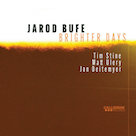

Jarod Bufe: Brighter Days
Calligram Records
Seven years on from his debut album New Spaces, tenor saxophonist Jarod Bufe returns with the same personnel for his follow-up Brighter Days. Operating out of Chicago, he's recruited three of the region's top-of-the-line names in electric guitarist Tim Stine, acoustic bassist Matt Ulery, and drummer Jon Deitemyer, and while each is a bandleader in his own right, Bufe's partners serve his vision whilst also imposing their personal stamps on the music. If the four sound locked-in, it's not only because they've recorded two albums together, it's also because the quartet enjoyed a residency at FitzGerald's Sidebar, a venue just outside Chicago, from 2012 through 2019 and has returned regularly since the club's post-lockdown reopening. Regular live gigs are how rapport is built, and the performances on the new release attest to the chemistry the four have achieved.
While some tenor players favour a guttural growl, Bufe's airy tone is sometimes more reminiscent of an alto (though he is in places blustery too). That lightness goes hand-in-hand with a nimble and acrobatic attack—Bufe “floating like a butterfly and stinging like a bee,” to borrow Muhammad Ali's familiar phrase. That leaves ample space for Stine, Ulery, and Deitemyer to maneuver within, and the guitarist in particular adopts a like-minded approach that's wholly complementary to the leader's. Of course, one of the recording's primary pleasures is listening to the bassist and drummer, who've partnered on many albums. Like Bufe, they're judicious in their note choices and strike that fine balance between establishing their presences without overplaying. Recorded at Chicago's Palisade Studios in May 2024, the collection features nine Bufe originals written in response to the pandemic. That dispiriting time might be reflected in titles such as “Forgotten” and “Fighting for Hope,” but rest assured Brighter Days doesn't wallow in despair.
Catching the ear immediately is the moody vamp “Midnight,” not only for its alluring mid-tempo groove but for the entrancingly sultry theme Bufe wrote for the tune (interestingly, the set ends with a smoldering vamp similar in character to the opener, “Window Well”). The material's deceptively seductive in the way it unassumingly arrests the attention with an attack that's soulful and even a little bit funky. The leader makes his presence felt with a dynamic opening solo that Stine follows with his own spiky statement. Meanwhile, Ulery and Deitemyer respond to the soloists by calibrating their flow to the changes arising at each turn. Speaking of album pleasures, another has to be Stine's always-imaginative comping, as shown in this opening performance. Ever the generous host, Bufe has the guitarist open “The Forgotten Before,” a bright and breezy waltz that faintly recalls a songbook classic like "Baubles, Bangles, & Beads.” Its singing tone suits the quartet terrifically in calling forth swinging solos from Stine, Bufe, and Ulery. Elsewhere, the four dig into the hard-walking blues of “Loss of Agency” with an equivalent degree of comfort, the leader particularly voluble during this go-round.
The aforementioned alto-like quality in Bufe's tenor comes to the fore in the soulful snap of “Fighting for Hope,” which finds the leader and Stine playing more like members of James Brown's The J. B.'s than a hardcore contemporary jazz outfit. Contrasts of mood and style are plentiful. Offering counterpoint to the uptempo numbers are two heartfelt ballads, “Goodnight, My Brooklyn Prince” a tender expression Bufe wrote in memory of Mark Colby, a close friend and collaborator for many years. With the tenor saxophonist emoting poignantly, there are moments in his solo that convey a Joe Lovano-like quality. In a similar vein is “Goodbye, Marlene,” which Bufe wrote as an affectionate memorial for his oldest friend's mother and is highlighted by the leader's opening cadenza.
All four are compelling and assured players, and the command they demonstrate on their respective axes comes from years of experience and dedication. Even better is the interaction between them, which is always astute and responsive. Ideally another seven years won't pass before the third statement by the quartet materializes. An outfit possessing such a strong rapport deserves to be captured on disc more frequently, no matter how often they might be gathering for gigs in the Chicago area.April 2025